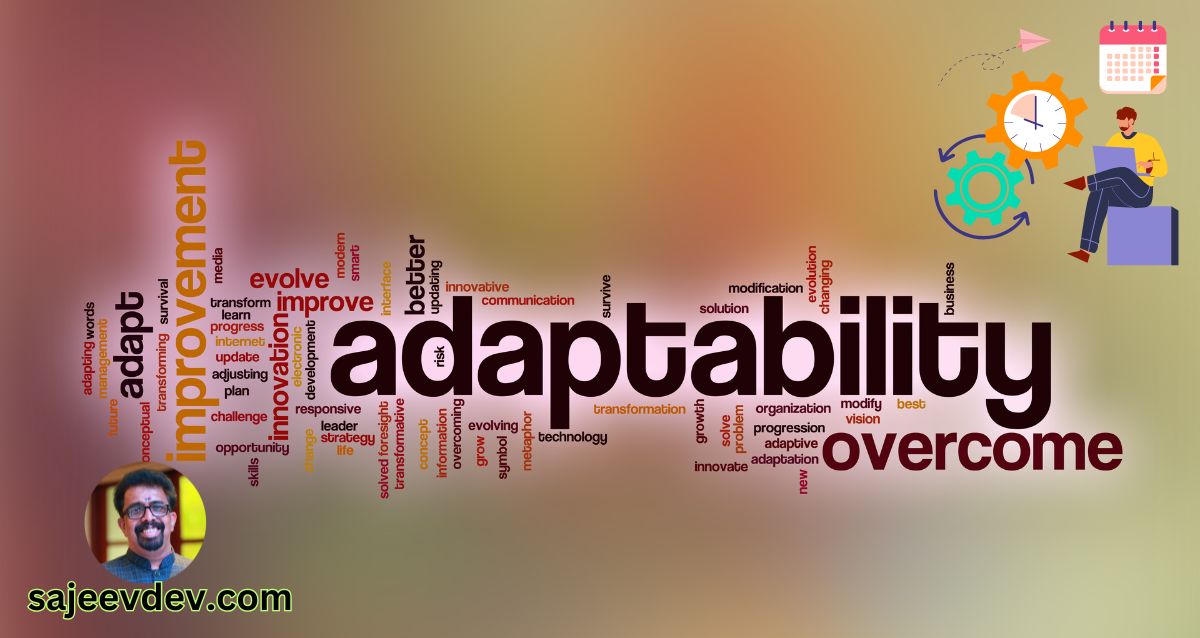Adaptability
In an increasingly dynamic and fast-paced world, the importance of adaptability cannot be overstated. Adaptability is defined as the ability to adjust to new conditions, a skill that has become essential for individuals navigating both personal and professional realms. As the landscape of our daily lives continues to shift due to technological advancements, economic fluctuations, and societal changes, the capacity to embrace and respond effectively to these changes is more vital than ever.
Adaptability extends beyond mere survival; it is about flourishing amidst uncertainty. Those who master this skill not only manage to cope with changes but also utilize them as opportunities for growth and development. For instance, the ability to pivot in response to market shifts is crucial for businesses looking to maintain a competitive edge. Similarly, individuals equipped with strong adaptability skills can navigate career transitions and personal challenges with confidence and resilience.
Moreover, adaptability is considered a superpower because it embodies a proactive mindset. It encourages individuals to remain open to new ideas, embrace experimentation, and foster a willingness to learn from failures. This mindset does not just apply to a singular event but manifests in a continuous journey of improvement and self-discovery. In essence, adaptable individuals cultivate a robust toolkit of skills that allows them to tackle challenges head-on, turning potential setbacks into pathways for success.
Thus, as we delve deeper into the myriad dimensions of adaptability throughout this blog post, we will uncover its relevance in various aspects of life, the underlying psychological mechanisms that support this skill, and practical strategies to enhance one’s adaptability. Understanding adaptability is the first step toward unlocking its full potential as a cornerstone for both personal empowerment and professional achievement.
The Importance of Adaptability
Adaptability has emerged as a crucial skill in an ever-changing world, impacting various facets of life such as professional success, interpersonal relationships, and personal growth. Individuals who demonstrate a high level of adaptability are often better equipped to handle unexpected challenges and shifting circumstances, thereby enhancing their overall effectiveness in both personal and professional arenas. Research indicates that adaptable individuals possess the ability to adjust their thoughts and behaviors in response to new information, fostering resilience in the face of adversity.
In the workplace, adaptability can significantly influence career advancement and job satisfaction. Studies have shown that employees who embrace change and can pivot when necessary tend to thrive in dynamic environments. For instance, a 2020 survey highlighted that organizations prioritizing adaptability in their workforce saw a 25% increase in productivity. Employees who are open to learning new skills and embracing technological advancements are often viewed as valuable assets, leading to greater opportunities for promotions and positive recognition within their companies.
Moreover, adaptability plays a pivotal role in cultivating healthy relationships. Individuals who can adjust their communication styles and approaches to suit different personalities are more likely to maintain harmonious connections. This skill allows for more effective conflict resolution, as adaptable individuals are better able to empathize with others’ viewpoints and find common ground. Research in social psychology indicates that such flexibility in interpersonal interactions nurtures trust and collaboration, essential components in both personal and professional relationships.
Lastly, personal development is significantly enhanced by adaptability. Those who are open to reinventing themselves and pursuing new interests or activities can unlock potential they may not have recognized otherwise. The ability to accept change propels self-discovery and growth, ensuring individuals can navigate life’s uncertainties with confidence and resilience. In conclusion, the significance of adaptability cannot be overstated; it is a fundamental skill that enables individuals to succeed in various aspects of life. By cultivating this superpower, one can better tackle challenges and seize opportunities for growth.
Key Traits of Adaptable People
Adaptable individuals possess a unique set of traits that enable them to navigate change and uncertainty with remarkable ease. One of the most significant characteristics of adaptable people is their open-mindedness. This trait allows them to embrace new ideas and perspectives, facilitating a more profound understanding of diverse situations. Open-minded individuals are willing to consider alternative solutions, which can lead to innovative approaches when confronted with challenges.
Another vital quality is resilience, which enables adaptable individuals to recover quickly from setbacks. Resilient people view challenges as opportunities for growth rather than insurmountable obstacles. This perspective helps them maintain focus and motivation, even in the face of adversity. Such individuals are often seen as role models, as they inspire others to persist and overcome difficulties, thereby fostering an environment of support and collaboration.
A growth mindset is also a cornerstone of adaptability. Those with a growth mindset believe that abilities and intelligence can be developed through dedication and hard work. This outlook encourages experimentations and learning from failures, making adaptable individuals more equipped to handle unexpected changes in their environments. They are not daunted by the idea of stepping outside their comfort zones; on the contrary, they welcome it as a chance to enhance their skills and broaden their experiences.
The combination of open-mindedness, resilience, and a growth mindset plays a crucial role in how adaptable individuals respond to varying circumstances. By cultivating these traits, one can effectively improve their ability to adjust to new realities, fostering both personal and professional success. Embracing adaptability in this way paves the way for continuous improvement and a robust approach to life’s challenges.
Overcoming Resistance to Change
Resistance to change is a prevalent challenge that many individuals encounter in both personal and professional contexts. Understanding the psychological barriers that can inhibit adaptability is essential to effectively overcoming them. Common reasons for resistance include fear of the unknown, loss of control, and discomfort associated with new situations. When individuals are faced with change, they may feel anxious about potential risks and uncertainties, thus leading to a preference for familiar routines.
One effective strategy to combat this resistance is fostering a growth mindset. This approach encourages individuals to view challenges as opportunities for development rather than obstacles. By shifting the focus from potential failure to potential growth, it becomes easier to embrace change. Additionally, engaging in self-reflection to identify personal triggers for resistance can provide valuable insights, allowing individuals to address these barriers proactively.
Moreover, encouraging open communication is pivotal in creating a supportive environment for change. Individuals should be given the opportunity to express their concerns and ask questions about new processes or initiatives. This dialogue not only alleviates anxiety but also fosters a sense of belonging and assurance during periods of transformation. Providing clear and transparent information about the reasons behind change can further help in reducing resistance.
Another viable tactic for promoting adaptability is incremental exposure to new experiences. Gradually introducing small changes allows individuals to acclimatize without feeling overwhelmed. This method can lessen the fear associated with significant shifts, making it easier to eventually embrace larger transformations. Offering training or support resources can also facilitate smoother transitions, thereby enhancing individuals’ confidence in their ability to adjust.
In conclusion, understanding the psychology behind resistance to change is crucial in cultivating adaptability. By implementing strategies such as fostering a growth mindset, promoting open communication, and gradually introducing changes, individuals can overcome their hesitance and unlock their potential for success in a dynamic world.
Embracing Lifelong Learning
In a world that is constantly changing, the ability to adapt is becoming increasingly essential. One of the most effective ways to foster adaptability is by embracing lifelong learning. Lifelong learning is not limited to formal education; it encompasses a mindset characterized by curiosity and the pursuit of knowledge throughout one’s life. By remaining open to new ideas, experiences, and skills, individuals can navigate the challenges posed by an ever-evolving environment.
The pursuit of knowledge can take many forms, from enrolling in formal courses to engaging in self-directed study through books, podcasts, and online resources. Such activities not only enhance one’s understanding of various subjects but also cultivate critical thinking and problem-solving skills. These skills are crucial for adapting to new situations and responding effectively to changing circumstances. A curious individual who actively seeks out knowledge is often better equipped to handle unexpected challenges and identify opportunities where others may see obstacles.
Moreover, establishing a habit of lifelong learning can lead to personal growth and professional development. Engaging with diverse fields of study can inspire innovation and creativity, allowing individuals to approach problems from new perspectives. This adaptability is especially important in the modern workforce, where technological advancements and shifts in market demands require ongoing skill enhancement. By committing to continual education, professionals not only stay relevant but also position themselves as valuable assets within their organizations.
Ultimately, embracing lifelong learning is a key component of adaptability. By fostering a commitment to learning and remaining open to new experiences, individuals can enhance their ability to adapt to change, thereby unlocking greater opportunities for success in both their personal and professional lives. The journey of learning, when approached with enthusiasm and commitment, becomes a powerful tool for navigating life’s uncertainties.
Building a Support System
Establishing a robust support system is vital for enhancing adaptability in various aspects of life. A well-rounded network of friends, family, mentors, and colleagues can provide the necessary encouragement and perspective during periods of transition or uncertainty. Such networks help individuals share experiences, resources, and insights that can significantly ease the challenges posed by change. The emotional support garnered from positive relationships not only alleviates stress but also fosters resilience, enabling individuals to embrace change more readily.
One significant advantage of a support network is the opportunity it provides for sharing diverse viewpoints. Engaging with individuals who have faced similar challenges can impart valuable lessons that may not have been considered otherwise. These exchanges often lead to a broader understanding of circumstances, empowering individuals to approach problems with renewed vigor and creativity. Furthermore, supportive friends or mentors can offer constructive feedback, allowing one to navigate transitions effectively and with confidence.
The presence of positive influences in our lives plays a crucial role in maintaining motivation and focus. During times of uncertainty, those surrounding us can help to reinforce our capabilities, reminding us of our strengths and past accomplishments. This encouragement can be pivotal when we find ourselves grappling with self-doubt or fear of the unknown. Additionally, a supportive network frequently engages in active listening, providing a safe space for individuals to express concerns and articulate their feelings. This validation not only fosters emotional well-being but also cultivates an environment in which adaptability can flourish.
In summary, a strong support system is instrumental in nurturing adaptability. By surrounding oneself with positive influences and engaging in open dialogue, individuals can enhance their resilience and navigate the complexities of change more effectively. Cultivating such networks is not merely beneficial; it is, in fact, essential for those aspiring to thrive in an ever-evolving landscape.
Practical Strategies for Enhancing Adaptability
Enhancing one’s adaptability is essential for navigating the complexities of modern life, characterized by rapid changes and unforeseen challenges. Implementing practical strategies can bolster this valuable skill. One effective technique is mindfulness. By practicing mindfulness, individuals can cultivate a greater awareness of their thoughts and emotions, enabling them to respond rather than react to new situations. Mindfulness practices such as meditation or deep-breathing exercises allow individuals to center themselves and approach change with a clear mind.
Another critical strategy for enhancing adaptability involves setting flexible goals. Traditional goal-setting often emphasizes rigid timelines and specific outcomes, which may lead to frustration when faced with unexpected changes. Instead, adopting a flexible approach to goal-setting encourages individuals to create adaptable objectives that can evolve alongside shifting circumstances. This can involve breaking down larger goals into smaller, manageable tasks that allow for reassessment as conditions change, thus fostering a proactive mindset that embraces change rather than resists it.
Practicing resilience is also fundamental for those striving to develop adaptability. Resilience refers to the capacity to recover quickly from difficulties, and it complements adaptability perfectly. Building resilience can be achieved through positive self-talk, seeking social support, and maintaining a problem-solving attitude. By reframing challenges as opportunities for growth, individuals can enhance their ability to pivot and embrace change when it arises. Additionally, regularly exposing oneself to diverse experiences can increase one’s tolerance for discomfort, further cultivating adaptability in various contexts.
Incorporating these strategies into daily life can lead to profound improvements in one’s adaptability. By practicing mindfulness, setting flexible goals, and reinforcing resilience, individuals can unlock this essential superpower, better equipping themselves to navigate the unpredictable nature of contemporary challenges.
Success Stories: Adaptability in Action
Adaptability is a crucial trait for success, demonstrated vividly through numerous real-life stories of individuals and organizations. One prominent example is Kodak, a company once synonymous with photography. Despite its early dominance in the film industry, Kodak struggled to adapt to the rapid shift towards digital photography. However, following bankruptcy, the company underwent a significant transformation, refocusing on digital imaging and printing technologies. This pivot not only salvaged the brand but also allowed it to thrive in new markets, proving that adaptability can turn challenges into opportunities.
Another notable instance is Netflix, which originally started as a DVD rental service. Recognizing the shifting preferences of consumers towards streaming content, Netflix made a groundbreaking decision to transition its business model. By embracing this significant change, the company not only stayed relevant but grew to become a global leader in entertainment. Their original content production further showcased the power of adaptability, allowing them to cater to diverse audiences and become a dominant force in the industry.
On an individual level, the story of Malala Yousafzai exemplifies personal adaptability in the face of adversity. Following a life-threatening attack due to her activism for girls’ education in Pakistan, Malala showcased remarkable resilience and ability to adapt. Instead of retreating, she continued to advocate for education across the globe, becoming a symbol of strength and determination. Her story underlines that adaptability is not exclusively about changing external circumstances but also about personal growth and transformation.
These examples illustrate that whether on an organizational or individual level, adaptability is a critical superpower that can lead to significant success and positive outcomes. By embracing change, learning, and evolving, organizations and individuals alike can unlock their full potential in a rapidly changing world.
As we reflect on the discussions around adaptability, it becomes clear that this trait is not only essential for personal growth but also for professional success
As we reflect on the discussions around adaptability, it becomes clear that this trait is not only essential for personal growth but also for professional success. In a world characterized by rapid change, the ability to adjust to new circumstances has emerged as a crucial skill. Whether it is embracing technological advancements, navigating shifting market dynamics, or responding to unforeseen global events, the capacity to adapt is increasingly becoming a determinant of success.
The importance of adaptability cannot be overstated. It allows individuals and organizations to remain relevant in their fields and to seize opportunities that arise from change. Those who are able to pivot in response to evolving situations can enhance their problem-solving abilities and foster resilience, equipping them to face challenges head-on. Moreover, adaptability encourages continuous learning and growth, fueling innovation and creativity. This transformative skill empowers individuals to not only survive in uncertain conditions but to thrive, transforming obstacles into avenues for success.
As we look to the future, it is imperative to view adaptability as a lifelong journey rather than a destination. The landscape of both personal and professional realms is constantly in flux, necessitating a mindset that embraces change. Individuals should consider developing their adaptability through various means, such as seeking feedback, being open to new ideas, and cultivating a strong support network. By nurturing adaptability, one opens the door to new possibilities, creating a pathway for personal fulfillment and achievement.
In conclusion, the superpower of adaptability will continue to play a vital role in shaping our future. By embracing this critical skill, individuals can enhance their resilience and successfully navigate the complexities of an ever-changing world. Those who master the art of adaptability will undoubtedly find themselves equipped to turn challenges into opportunities.









